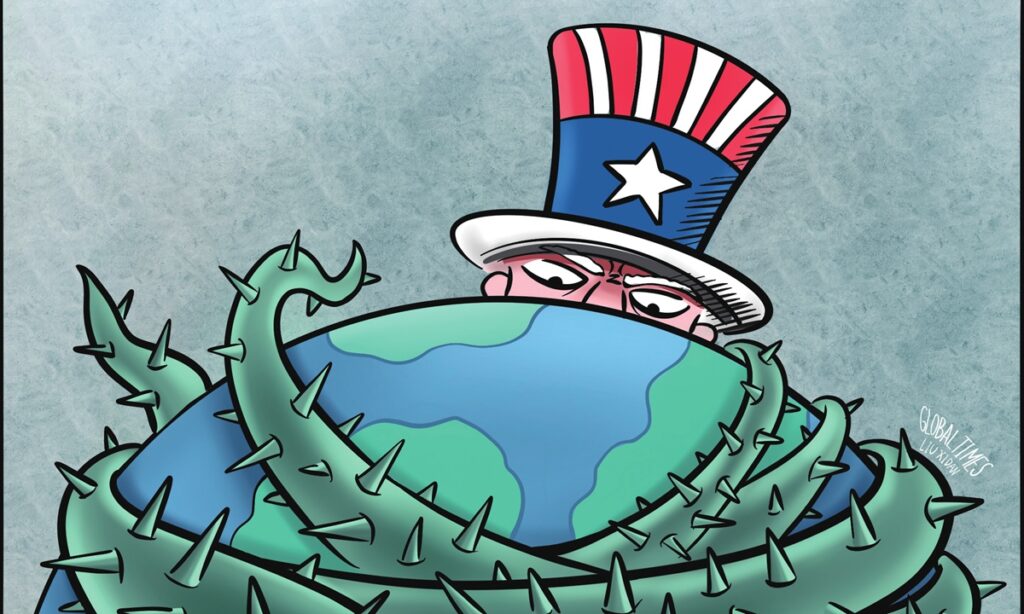US President Joe Biden arrived in France on Wednesday for the 80th anniversary of D-Day landings. At a time meant for reflecting on the hard-won peace, US bellicose genes have been reactivated. On the same day, US magazine Foreign Affairs sounded the drums of war, calling the US to unite its allies to prepare for three-theater wars.
The article “A Three-Theater Defense Strategy” published in Foreign Affairs on Wednesday lists quite a few reasons and specific approaches for “how America can prepare for war in Asia, Europe, and the Middle East.”
The article said the US is currently involved in two wars – Ukraine’s in Europe and Israel’s in the Middle East – while facing the prospect of a third in East Asia. “Washington is fortunate to have capable allies and friends in East Asia, Europe and the Middle East … They must do a better job of working together,” it said.
Although the word Foreign Affairs uses in the headline is “defense,” it seems more like that the US is already on the offense, designing and creating the third theater. As it is coded in Washington’s DNA – whenever it feels challenged, the US tends to resort to war and military means to solve problems, even if the current limited peace and stability is being eroded.
An anonymous military expert told the Global Times that the US has entered an era of waning hegemony as the world moves toward multipolarity, which the US finds difficult to accept. To maintain its dominance, the US needs support from its allies, including NATO, the EU and even some countries in the Asia-Pacific region.
However, if a three-front war is the answer to US sense of insecurity, the author and the media only display their ignorance and arrogance. The US is incapable of managing three simultaneous wars, even with the backing of its allies. The article significantly overestimates the strength of both the US, its allies and their unity.
The call to prepare for three-front warfare sounds like bluffing. However, the reality is quite different. In the Russia-Ukraine conflict, Kiev is becoming increasingly passive. In the Israel-Palestine conflict, Arab countries, as well as countries worldwide, are showing greater unity in opposing Israel’s actions while doubting US credibility and its so-called rules-based order. In the Asia-Pacific region, very few countries are willing to support the US against China. Besides a few US staunch allies like Japan and Australia, other countries remain neutral. Even in the South China Sea disputes, where the US encourages the Philippines to be provocative, other ASEAN members do not take sides. Regarding the Taiwan question, more than 180 countries and international organizations have reaffirmed their commitments to the one-China principle and their support for China in safeguarding its sovereignty and territorial integrity. Given this, how can the US possibly engage in three simultaneous wars?
Remember as early as October last year, the White House warned that the US only has enough money to meet Ukraine’s “urgent battlefield needs” in the short term, and the Pentagon warned Congress it is running low on money which could harm US military’s readiness.
Not to mention Biden’s decision to attend the D-Day ceremony in France while skipping the Ukraine Peace Summit in Switzerland, which clearly shows his lack of confidence in Ukraine. He has no faith in Ukraine winning against Russia, nor in achieving any fruitful results from the peace summit.
That being the case, calling for US allies to prepare for a three-front war at this time seems more like a sign of US’ insecurity – concerned that its coalition might fall apart, and its lackeys may doubt US’ strength, leadership and commitment.
The Normandy landings, often referred to as D-Day, on June 6, 1944, marked the pivotal moment in World War II. On this historic day, American, British and Canadian troops stormed 50 miles of Normandy’s fiercely defended beaches in northern France, amid the relentless gunfire of Nazi Germany. Their bold action not only established a crucial Western front in Europe, but also complemented the efforts of the Soviet Union on the Eastern front, hastening the downfall of German fascism.
Today, as we reflect on the significance of the Normandy landings, it’s imperative to acknowledge the invaluable lesson they impart: the preciousness of peace. Failing to cherish and safeguard peace risks plunging humanity once again into the horrors of wars and devastation. The question arises: if the US were to engage in multiple wars simultaneously, could it trigger WWIII?
In the current era, US belligerent gene and wish to turn its network of allies into mechanism for maintaining American dominance are becoming a global threat. However, the stark reality is that any escalation to WWIII today would inevitably lead to a nuclear showdown. The author advocating for a third theater in this context seems to have overlooked it.
On this special day, what exactly should people commemorate and advocate for? An old veteran has provided the answer. One of oldest living survivors of World War II, Army veteran Dennis Schone’s wish is simple – He does not want to see another world war.
Global Times




